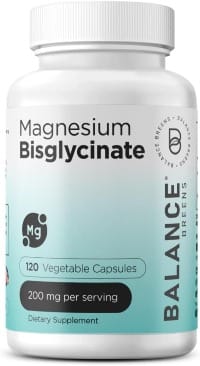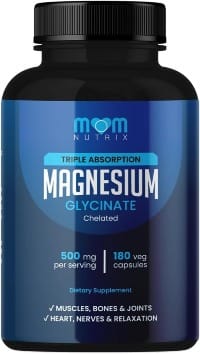Magnesium is an essential mineral that plays a crucial role in numerous bodily functions. With various forms of magnesium supplements available, it can be challenging to determine which one is best for your needs. In this article, we'll explore the differences between magnesium bisglycinate and magnesium glycinate, two popular forms of magnesium supplements.


Key takeaways:
• Magnesium bisglycinate and magnesium glycinate are essentially the same compound
• Both forms offer high bioavailability and are well-tolerated
• The "bis" in bisglycinate refers to two glycine molecules attached to one magnesium atom
• These forms may be beneficial for anxiety, sleep, and muscle function
Magnesium glycinate vs bisglycinate: Understanding the terminology
When it comes to magnesium glycinate vs magnesium bisglycinate, the confusion often stems from terminology. In reality, these two names refer to the same compound. Magnesium bisglycinate is the more accurate chemical name, while magnesium glycinate is the common name used in the supplement industry.
The prefix "bis" in bisglycinate indicates that two glycine molecules are attached to one magnesium atom. This structure contributes to the compound's stability and absorption properties. So, whether you see a product labeled as magnesium glycinate or magnesium bisglycinate, you're looking at the same supplement.
Magnesium glycinate vs magnesium bisglycinate: Absorption and bioavailability
One of the primary reasons for the popularity of magnesium glycinate/bisglycinate is its high bioavailability. Bioavailability refers to the proportion of a substance that enters the bloodstream when introduced into the body and can have an active effect.
The glycine component of this magnesium form plays a crucial role in its absorption. Glycine is an amino acid that helps transport the magnesium across the intestinal wall, leading to better absorption compared to some other magnesium forms, such as magnesium oxide.
A study published in the Journal of the American College of Nutrition found that magnesium glycinate had a higher bioavailability than magnesium oxide, resulting in better absorption and utilization by the body.
Magnesium bisglycinate vs magnesium glycinate: Potential benefits
Both magnesium bisglycinate and glycinate (being the same compound) offer several potential health benefits:
- Anxiety reduction: Magnesium plays a role in regulating neurotransmitters that affect mood and stress response. A 2017 review published in Nutrients suggested that magnesium supplementation may help reduce anxiety symptoms.
- Improved sleep quality: The glycine component of this magnesium form may contribute to better sleep. A study in the journal Sleep and Biological Rhythms found that glycine supplementation improved subjective sleep quality.
- Muscle function support: Magnesium is crucial for proper muscle function. A review in Nutrients highlighted the importance of magnesium in preventing muscle cramps and supporting overall muscle health.
- Bone health: Magnesium is essential for bone formation and maintenance. Research published in Nutrients suggests that adequate magnesium intake is associated with higher bone mineral density.
It's important to note that while these potential benefits are promising, more research is needed to fully understand the effects of magnesium glycinate/bisglycinate supplementation.
Choosing the right magnesium supplement
When selecting a magnesium supplement, consider the following factors:
• Form: Magnesium glycinate/bisglycinate is generally well-tolerated and has good bioavailability.
• Dosage: Follow the recommended dosage on the product label or as advised by a healthcare professional.
• Quality: Choose supplements from reputable manufacturers that undergo third-party testing.
• Individual needs: Consider your specific health goals and any existing medical conditions.
Remember, while supplements can be beneficial, it's always best to obtain nutrients from a balanced diet whenever possible. Foods rich in magnesium include leafy green vegetables, nuts, seeds, and whole grains.
Conclusion
In the debate of magnesium bisglycinate vs glycinate, it's clear that these terms refer to the same compound. This form of magnesium offers high bioavailability and is generally well-tolerated, making it a popular choice among consumers and healthcare professionals alike.
While magnesium glycinate/bisglycinate shows promise in supporting various aspects of health, including anxiety reduction, sleep quality, and muscle function, it's essential to approach supplementation with caution. Always consult with a healthcare professional before starting any new supplement regimen, especially if you have existing health conditions or are taking medications.
As we continue to unravel the complexities of human health and longevity, understanding the nuances of nutrient supplementation becomes increasingly important. The ongoing research into magnesium and its various forms contributes to our growing knowledge of how to optimize health and potentially extend our healthspan.
Interested in learning more?
Are you interested in learning more about the role of minerals in longevity? Subscribe to our newsletter for the latest updates on longevity science and research.
References:
- Walker AF, Marakis G, Christie S, Byng M. Mg citrate found more bioavailable than other Mg preparations in a randomised, double-blind study. Magnes Res. 2003;16(3):183-191. https://pubmed.ncbi.nlm.nih.gov/14596323/
- Boyle NB, Lawton C, Dye L. The Effects of Magnesium Supplementation on Subjective Anxiety and Stress-A Systematic Review. Nutrients. 2017;9(5):429. https://www.ncbi.nlm.nih.gov/pmc/articles/PMC5452159/
- Yamadera W, Inagawa K, Chiba S, Bannai M, Takahashi M, Nakayama K. Glycine ingestion improves subjective sleep quality in human volunteers, correlating with polysomnographic changes. Sleep and Biological Rhythms. 2007;5(2):126-131. https://onlinelibrary.wiley.com/doi/10.1111/j.1479-8425.2007.00262.x
- Zhang Y, Xun P, Wang R, Mao L, He K. Can Magnesium Enhance Exercise Performance? Nutrients. 2017;9(9):946. https://www.ncbi.nlm.nih.gov/pmc/articles/PMC5622706/
- Castiglioni S, Cazzaniga A, Albisetti W, Maier JA. Magnesium and Osteoporosis: Current State of Knowledge and Future Research Directions. Nutrients. 2013;5(8):3022-3033. https://www.ncbi.nlm.nih.gov/pmc/articles/PMC3775240/
Citations:
[1] https://www.healthline.com/health/magnesium-glycinate
[2] https://www.performancelab.com/blogs/sleep/magnesium-bisglycinate-vs-glycinate
[3] https://humantonik.com/magnesium-bisglycinate-vs-glycinate/
[4] https://www.medicinenet.com/benefits_of_taking_magnesium_glycinate/article.htm
[5] https://88herbs.com/magnesium-bisglycinate/
[6] https://www.medicalnewstoday.com/articles/315372
[7] https://www.thorne.com/ingredients/magnesium-bisglycinate













Member discussion